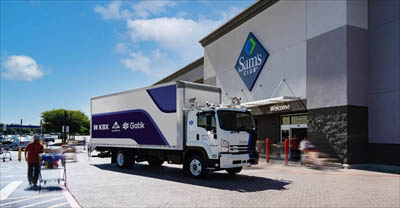For the first time, autonomous 26-foot box trucks are replacing Class 8 tractor-trailers along dedicated routes in Texas.
Gatik, which has been running self-driving pilot programs with Walmart and other companies, announced Tuesday that its technology will be used on linehaul routes previously served by KBX Logistics’ 53-foot trailers. KBX is a partner of Gatik’s in the program, which is taking place in the Dallas-Fort Worth metroplex. The program will begin in July.
“For the first time, Gatik will be disrupting short-haul Class 8 routes,” Gautam Narang, Gatik co-founder and CEO, told Modern Shipper.
The Gatik trucks — standard straight trucks with a rollup door on an Isuzu FTR platform — will haul product from Georgia-Pacific facilities in the area and bring those items to 34 local Sam’s Club stores. The operation is running seven days a week.
“They want high-frequency deliveries so they can [fill] just-in-time deliveries at stores,” Narang said.
Faster inventory replenishment
The Gatik autonomous trucks (with safety drivers) travel approximately 100 miles round trip and make three trips per day to area stores. The idea, Narang said, is that the 26-foot trucks are able to replenish inventory quicker rather than a store waiting for the next trailer to arrive, which could be days out. Without a need to fill a full truckload, the box trucks can handle more immediate inventory needs and create a more regular cadence of deliveries to the Sam’s Club locations.
“Our solution is perfectly suited to this class of short-haul market,” Narang said. “We can make the economics work because when the driver comes out, there are [efficiencies] across the board. It basically makes their store replenishment more efficient.”
Hayes Shimp, vice president of sales for Georgia-Pacific, said, “We are looking forward to testing this transformational technology to deliver Georgia-Pacific brands like Quilted Northern bath tissue and Dixie products to Sam’s Clubs. Once proven, we believe autonomous deliveries will enable us to remove cost and complexity from the supply chain so that we can better serve Sam’s Club and their members.”
Narang said the partnership is a multiyear agreement that is starting small as KBX explores how automation can make its logistics operations more efficient.
Redefining the Class 8 short-haul market
“KBX is focused on providing services that increase capacity and reduce costs in a safe, efficient way for the customers we serve,” said Paul Snider, president of KBX. “Our partnership with Gatik will enable us to redefine the traditional Class 8 short-haul market and deliver Georgia-Pacific goods with even greater speed and efficiency. We’re excited to see these operations form the foundation of KBX’s autonomous vehicle program as we prepare for wider-scale adoption of autonomous trucks to meet customer demand.”
Narang said, “Long term, the plan is not to deliver just to Sam’s Club locations, but to multiple [businesses].” He added that since joining the AllianceTexas Mobility Innovation Zone (MIZ), Gatik has started pilots with several companies in the area. Those other companies are not being named at this time.
MIZ is a purpose-built industrial development in north Texas that has been designed as a hub of supply chain innovation.
Gatik expands into Kansas
Gatik recently announced an expansion of operations into Kansas. It is already operational in Arkansas, Louisiana, Texas and Ontario, Canada. It began commercial operations in 2019, transporting goods with autonomous vehicles with a safety driver in the driver’s seat. However, in November 2021, it announced that the safety driver had shifted to the passenger seat in its box trucks operating autonomously in Arkansas.
In Arkansas, those vehicles are hauling loads from a Walmart dark store in Bentonville to a local Walmart Neighborhood Market about 3.5 miles away. This program with KBX is a broader and more expansive route but still one that can be predefined and repeated.
While the Gatik vehicles in other programs typically stop at stores, the autonomous trucks in this effort must navigate to dock doors. Narang said that is not an issue but that the technology is designed to handle scenarios in which another truck may be at the scheduled dock door or when it may need assistance in getting aligned properly to the dock.
“That is one area where the human operator can assist the truck,” he said. “We always have a human in the loop to assist.”
If the truck arrives and can’t complete its trip, there are predetermined locations for it to navigate to before requesting assistance.
